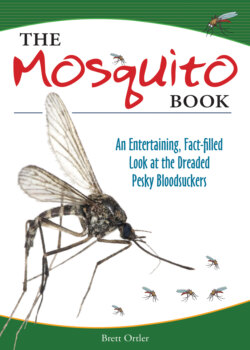Читать книгу The Mosquito Book - Brett Ortler - Страница 8
На сайте Литреса книга снята с продажи.
ОглавлениеFrequently Asked Questions
Why do mosquitoes bite?
Mosquitoes don’t actually obtain nutrition from blood. Instead, female mosquitoes use the blood to obtain the proteins needed to produce a batch of eggs. Without a “blood meal” most species can’t produce eggs.
How many mosquitoes are there in my yard?
This is one of the most common questions about mosquitoes, but it is also one of the hardest to answer. The reason is pretty obvious: mosquitoes are small, hard to track, and populations vary greatly by species, habitat, and light and weather conditions. This is all too easy to observe—your front yard might be miraculously mosquito-free, but mosquitoes might chase you out of your garden. Suffice it to say: we’re seriously, seriously outnumbered.
What’s the most effective repellent?
Not all mosquito repellents are created equal. DEET is considered the “gold standard” of repellents, so much so that all others are compared to it. A number of other effective repellents are now on the market, including Picaridin, Oil of Lemon Eucalyptus (aka PMD) and IR3535. Take note, however, that not every repellent works equally well against every species of mosquito, and they vary wildly by concentration and how long they protect you from mosquitoes. What’s more, some should not be used on young children. Always read the product labels and heed the directions when choosing a product. When in doubt, consult your doctor.
How can I fight back against mosquitoes?
Know your enemy. If you know where mosquitoes develop (standing water!), you can give them fewer places to develop. If you know when they are most active (dawn and dusk), you can avoid them at their worst. And if you know what to wear and which repellents to use, you can help protect yourself from being bitten.
What diseases can mosquitoes transmit?
Quite a few of them, unfortunately. In the tropics, mosquito-borne diseases represent one of the greatest health threats, as mosquitoes transmit malaria, yellow fever, Dengue fever, and a host of other diseases. In the U.S., we’re mostly spared from the worst of these diseases, though travelers can contract them overseas, and outbreaks of some (Dengue, for instance) are not unheard of, especially in areas such as Florida and Hawaii.
Unfortunately, a number of other mosquito-borne diseases are widespread in the U.S., including West Nile virus and a number of varieties of encephalitis. Outbreaks of these diseases generally occur in the summer (when mosquitoes are more active), and there are thousands of cases each year, leading to many hospitalizations and even some deaths.
If I trap a mosquito’s proboscis and/or flex a muscle in the vicinity of the area where a mosquito lands, can I cause it to ingest too much blood and explode?
Nope. When a mosquito is filled with blood, its nervous system essentially has a “shut-off valve” that tells it to stop ingesting more blood. So if you hold the mosquito there or flex the muscle, it won’t ingest more blood. However, in what must have been a satisfying experiment, researchers have successfully severed that nerve connection, which led mosquitoes to ingest several times their capacity and eventually explode.
Can mosquitoes transmit HIV?
Thankfully, no. The HIV virus cannot survive1 in a mosquito; plus, they only ingest a very small amount of the virus.
